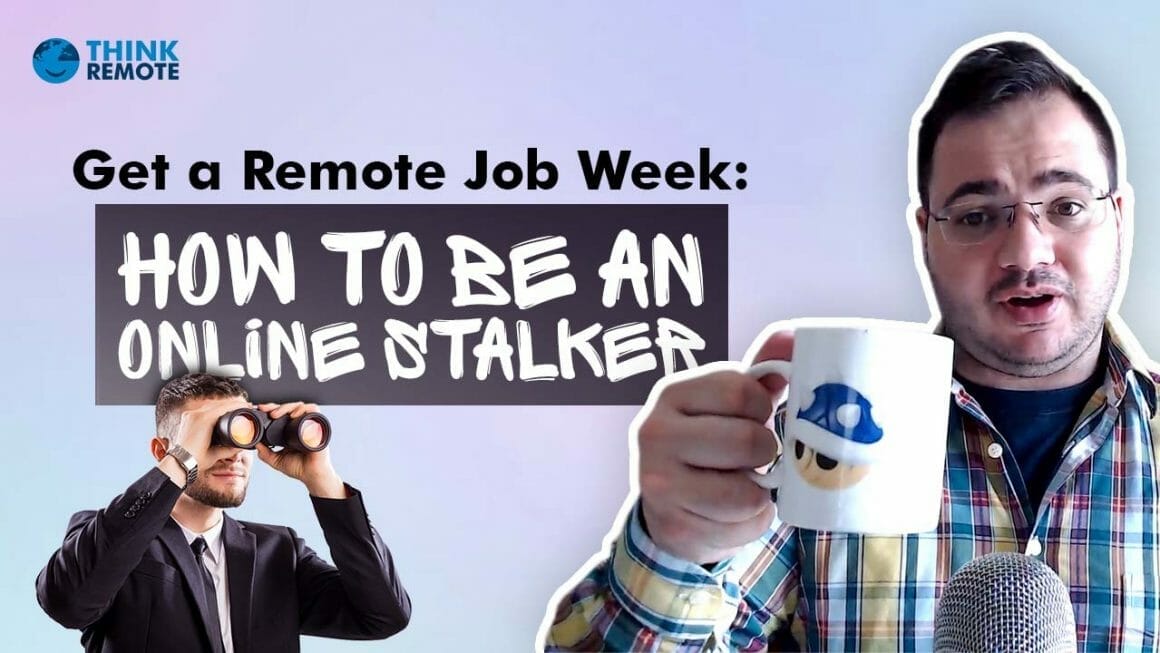You are watching Get A Remote JOB Week, where Luis talks about everything you’ll need to consider to get a remote job. In today’s video, he shares all the insights on How To Be An Online Stalker!
Would you like to become an effective online stalker to get a remote job? What should you have to take into account?
An online stalker is someone who researches and builds connections. Ideally, it would help if you did this research before applying for a remote job. But if you haven’t, once your interview has been set, it’s time to become an effective stalker.
Learn about the company you’ve applied to, google them, find them on Twitter, find them on Facebook. Please get to know what they do, what they’re good at, become an expert at their webpage.
Watch the video to know more details!
Luis:
Welcome ladies and gentleman to find a remote job week, day three, how to be an online stalker. Yep. It’s Virtual Coffee Chat with Luis. Let’s have a sip of coffee and learn how to be effective online stalkers to get a remote job. Now, obviously don’t be an evil stalker, right? I’m saying be an online stalker in the nicest sense, which is someone, that researches and builds connections. So what does this mean? Well, once you apply for a remote job, and ideally you are going to do this before you write your application letter, but at the very least do it before you go in for an interview, learn about the company that you’re applying, right?
Google them. Find them on Twitter. Find them on Facebook. Go to their website. Pay particular attention to the teams page and the how we work page if they have it. Read a couple of articles in their blog and figure out what’s the mission of the company, what are the values, what they expect from their team, how they work. I mean, some companies even have their whole manuals for employees online. That’s the case with GitLab, I believe, so, and Buffer as well. Buffer is 100% transparent. So you can find everything about working there. But even companies that don’t do a big show of that. Usually, if you go to their blog, you can find out how they learn stuff, right? You can find out how they do stuff, how they expect people in their teams to do stuff.
So let’s get to the stalking part of the conversation. Now, what you want to do is find people working there, right, find your possible future colleagues, right, on social networks, especially on LinkedIn. On LinkedIn, this tends to work quite well. Of course, politely in the non-spammy manner. Engage in conversation with them, right? Just say right out, right? Send them a private message, if they have the option available to send them a private message saying, “Hey, this is my name. I love the company you work for. I’m applying for a job there. Are you available for giving me a couple of tips or for telling me a bit about what’s it like to work there?” That’s it. Don’t be pushy. Don’t be a pushy stalker. Be a nice stalker, right?
Follow up after a day or two, and if they don’t reply and then obviously if they don’t reply after your followup, clearly they’re not interested. Don’t be a pain on those people. Don’t be a drag in their lives. Move on to the next one. There should be plenty. By the way, if you have an interview scheduled and if you manage to find out who is interviewing you, the person that’s attending the interview, then maybe you won’t want to get in touch with that person, because that would look weird and it would probably look like you’re trying to cheat. But look them up, right? See if they have any published articles. I mean, a lot of people publish something in their LinkedIn feeds or even they have personal blogs, et cetera.
Even if that’s not the case, right, even if that’s not the case, you can at least scroll to their feed and figure out the kind of things that they shared, the kind of things that they’re interested in, et cetera. So this is all to create an idea of the kind of profile that the company is looking for, the businesses looking for and how they deal with remote work. Well, First of all, you can see if that fits your way of working. Don’t pretend, if you lie your way into a remote job, you’re not going to last a long time there, believe me. But just to figure out what the expectations are, what the people are like and prepare the best you can based on that information.
I think this was it for this virtual coffee chat. This has get a remote job week and we’ve had two previous videos on the topic. The first one was on clarity of written communication. The second one was on video etiquette. You can find those on the Think Remote Channel, just look for the Virtual Coffee Chat, get a remote job week. If you’d like to be notified about the two next episodes, I saved the best for last, of course, subscribe and press the little bell button on the corner of the YouTube window so you get notified. Of course, like, share. Sharing is caring. For more tips on how to remote work, please head to thinkremote.com. This was Virtual Coffee Chat with Luis. See you tomorrow.






